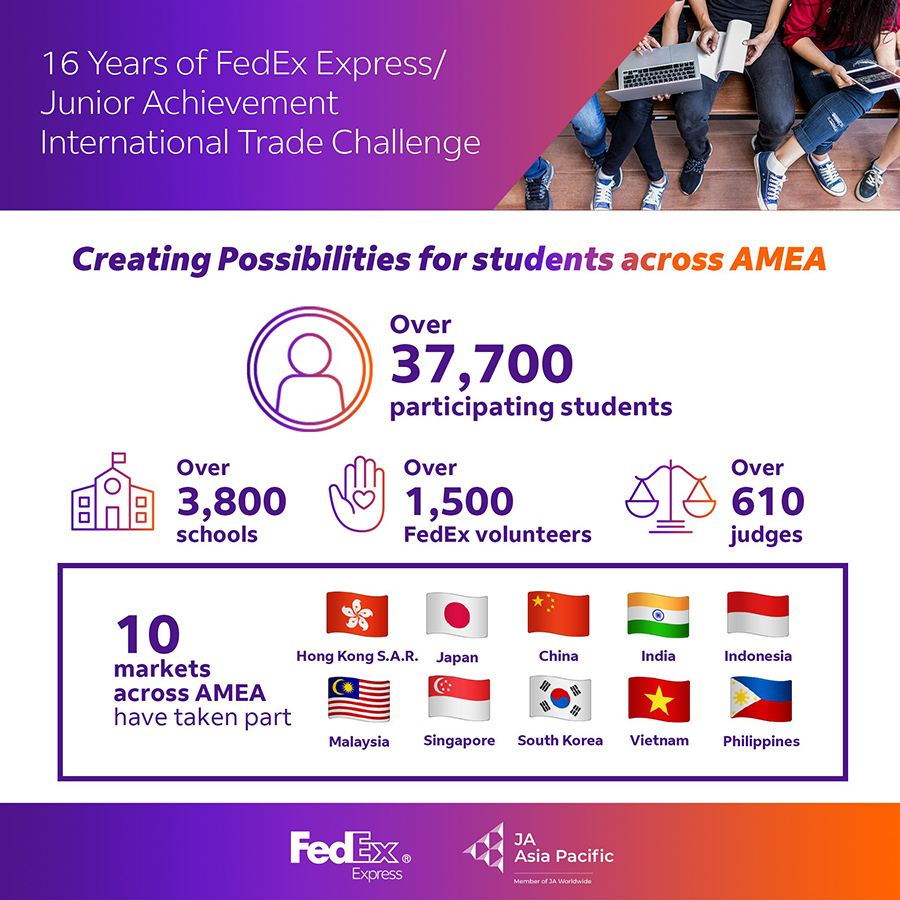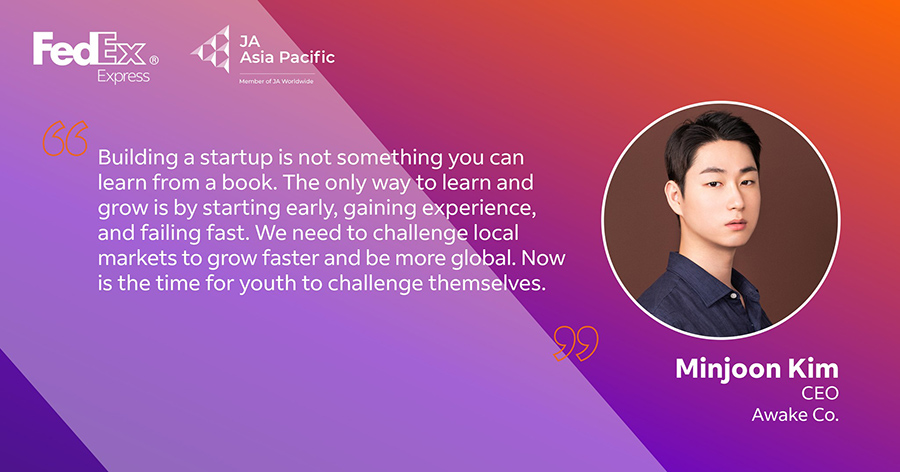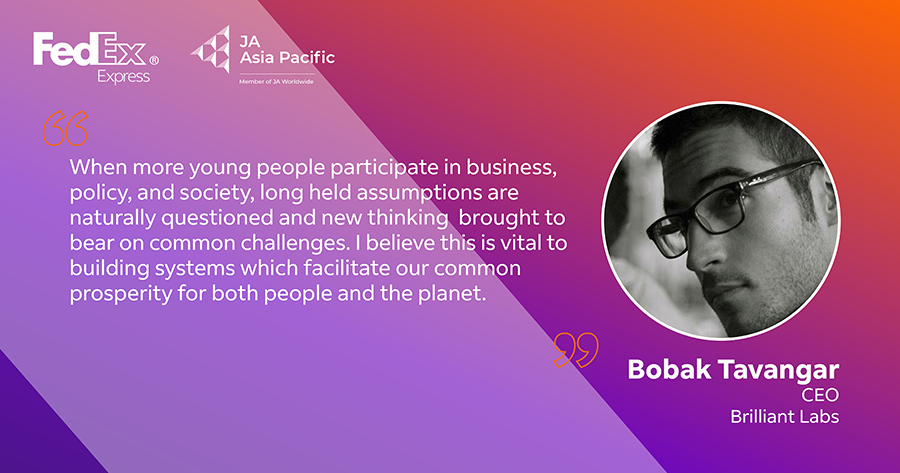Finding The Talent Of Tomorrow: Our Youth Entrepreneurship Competition
Our International Trade Challenge is an annual contest to find the best entrepreneurial minds amongst students in Asia Pacific. We find out what it takes to triumph at the Grand Finals.
For 16 years, the FedEx Express/JA International Trade Challenge (ITC) has provided young entrepreneurs with an international platform to gain real-world business insights and connect with other budding entrepreneurs. Since 2007, it’s helped transform traditional classroom learning into real-life, hands-on experiences for more than 37,700 students.
The International Trade Challenge is now in its 16th edition
Over 4,800 participants representing 10 markets – Hong Kong SAR, India, Indonesia, Japan, Malaysia, the Philippines, Singapore, South Korea, Thailand, and Vietnam – competed for the top spots this year. After regional workshops that determined the finalists from each market, 60 students took part in the Grand Finals. Finalists presented their ideas to a panel of business leaders and entrepreneurs following three days of intense competition, held virtually from 9-11 August 2022.
The International Trade Challenge is now in its 16th edition
Over 4,800 participants representing 10 markets – Hong Kong SAR, India, Indonesia, Japan, Malaysia, the Philippines, Singapore, South Korea, Thailand, and Vietnam – competed for the top spots this year. After regional workshops that determined the finalists from each market, 60 students took part in the Grand Finals. Finalists presented their ideas to a panel of business leaders and entrepreneurs following three days of intense competition, held virtually from 9-11 August 2022.

This year, teams were briefed to design a market entry strategy for a sustainable product targeted at German consumers. With increasing focus on the environmental impact of products and what role businesses should play to help tackle climate change, the challenge was reflective of the current business climate.
Winners of today are the business talents of tomorrow
The winning team comprised Filipino student Jakecob M. Jacob and Yau Li Ting Jamie from Singapore. The idea that won the judges over? A sustainable beer called ‘Loaf’, brewed from surplus bread that addresses food waste, promotes sustainability and is a nod to German culture. Both winners valued their opportunity to “learn from our inspiring mentors and judges” and say they have emerged “even more committed to begin our journey to entrepreneurship.”
Winners of today are the business talents of tomorrow
The winning team comprised Filipino student Jakecob M. Jacob and Yau Li Ting Jamie from Singapore. The idea that won the judges over? A sustainable beer called ‘Loaf’, brewed from surplus bread that addresses food waste, promotes sustainability and is a nod to German culture. Both winners valued their opportunity to “learn from our inspiring mentors and judges” and say they have emerged “even more committed to begin our journey to entrepreneurship.”

The food and beverage space proved a popular choice as competitors looked to pitch products that appealed to a mass segment. First runners-up Simar Singh from India and Tatsuru Taguchi from Japan came up with a nutritious, eco-friendly range of drinks made from herbal tea, purified algae, and seaweed from the Baltic Sea which they creatively named ‘Das Bubble’.
Second runners-up Supaseth Julerttrakul (Thailand) and Ilangovan Harishiga (Singapore) put forward an innovative idea to tackle the 200,000 tons of waste produced each year from the production of conventional feminine hygiene products. They pitched ‘Cura’ as a compostable alternative to conventional sanitary napkins made from water hyacinth.
A competition to test business acumen
The International Trade Challenge formula remains similar each year. Instead of pairing up with peers from their home country, finalists are shuffled to form mixed teams. This encourages people skills and fosters cross-cultural collaboration: ‘soft’ skills that future business owners need. Finalists cannot get by on talent alone. They need to have excellent interpersonal skills as well as communicate their ideas well enough to persuade a panel of judges who have launched successful ventures of their own.
Second runners-up Supaseth Julerttrakul (Thailand) and Ilangovan Harishiga (Singapore) put forward an innovative idea to tackle the 200,000 tons of waste produced each year from the production of conventional feminine hygiene products. They pitched ‘Cura’ as a compostable alternative to conventional sanitary napkins made from water hyacinth.
A competition to test business acumen
The International Trade Challenge formula remains similar each year. Instead of pairing up with peers from their home country, finalists are shuffled to form mixed teams. This encourages people skills and fosters cross-cultural collaboration: ‘soft’ skills that future business owners need. Finalists cannot get by on talent alone. They need to have excellent interpersonal skills as well as communicate their ideas well enough to persuade a panel of judges who have launched successful ventures of their own.

The competition also reinforces that today's Asia-based start-ups are thinking globally, with a need to create products or business models that can work in any number of overseas markets.
Learning the ropes from business mentors
One of the greatest benefits to the students is the opportunity to hear from the judges; local and regional industry leaders who provide mentorship. Judges this year were impressed by the organization of the virtual competition and the innovative ideas that students put forward.
Robin Tuerlings, Founder of The Start Up Buddy, a platform for new start-ups, was a judge last year and returned to check out the latest crop of talent:
“The students were brilliant again, and the ideas were fun and creative. The pitches were better than I have seen from a lot of experienced professionals. Only one can take first place, but they are all winners to me."
Judges also offered their own take on how to succeed as entrepreneurs, and advice for the future:
Learning the ropes from business mentors
One of the greatest benefits to the students is the opportunity to hear from the judges; local and regional industry leaders who provide mentorship. Judges this year were impressed by the organization of the virtual competition and the innovative ideas that students put forward.
Robin Tuerlings, Founder of The Start Up Buddy, a platform for new start-ups, was a judge last year and returned to check out the latest crop of talent:
“The students were brilliant again, and the ideas were fun and creative. The pitches were better than I have seen from a lot of experienced professionals. Only one can take first place, but they are all winners to me."
Judges also offered their own take on how to succeed as entrepreneurs, and advice for the future:

The panel ranged from impact entrepreneurs such as Rhea Singhal of Ecoware, who founded India’s largest sustainable packaging company tackling single-use plastic, to Lennise Ng, co-founder of a leading wholesale e-commerce marketplace in Malaysia, Dropee. One enterprising judge created French Crown, an Indian menswear brand that takes on one of the most wasteful elements of the clothing industry: dead stock. He emphasized the importance of climate-conscious values in today’s youth:
"It was great to see school students thinking this much about a sustainable future. The next generation is not taking the environment for granted,” said founder Ilesh Ghevariya.
"It was great to see school students thinking this much about a sustainable future. The next generation is not taking the environment for granted,” said founder Ilesh Ghevariya.

Nurturing the next generation’s potential
We know that the next generation aspires to entrepreneurship as a number one career choice, especially in Asia Pacific, but it’s unfamiliar territory for those starting out. The International Trade Challenge provides avenues of learning and a valuable platform to demonstrate that young people truly have the skillset and mindset to build thriving community-focused businesses.
These young participants are our future leaders, creators, and innovators. In close collaboration with Junior Achievement, we look forward to helping fuel the pipeline of entrepreneurship in the years ahead. Stay tuned for the next edition in 2023!
Are you a budding start-up or small business looking for tips and trends? Find business inspiration and insights here.
To find out more about the FedEx Express / JA International Trade Challenge, follow our Facebook page.
We know that the next generation aspires to entrepreneurship as a number one career choice, especially in Asia Pacific, but it’s unfamiliar territory for those starting out. The International Trade Challenge provides avenues of learning and a valuable platform to demonstrate that young people truly have the skillset and mindset to build thriving community-focused businesses.
These young participants are our future leaders, creators, and innovators. In close collaboration with Junior Achievement, we look forward to helping fuel the pipeline of entrepreneurship in the years ahead. Stay tuned for the next edition in 2023!
Are you a budding start-up or small business looking for tips and trends? Find business inspiration and insights here.
To find out more about the FedEx Express / JA International Trade Challenge, follow our Facebook page.
***
-
Previous
 Why SMEs Are Tapping Social Commerce In Asia
Why SMEs Are Tapping Social Commerce In Asia -
NextShipping 7 Chimpanzees To A Rescue Sanctuary

















 The Latest
The Latest